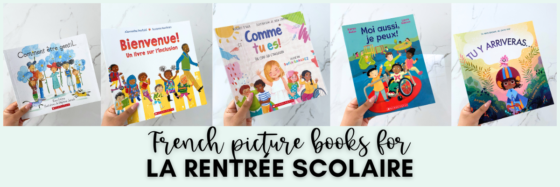
If you are a French teacher looking for meaningful & engaging French Orange Shirt Day activities and resources, look no further! Today I am sharing with you a number of French activities and resources for honouring Orange Shirt Day (or week!) in your classroom. At my school, we are actually spending the whole week honouring the children that never got to return home as well as the survivors of residential schools.
September 30 is journée du chandail orange or Orange Shirt Day.
Disclaimers
- I am a non-Indigenous educator. I am actually a Punjabi teacher who was born and raised in British Columbia. I have benefited significantly from the colonization of Canada. I am not selling or making money from any of the resources or activities shared in this post. This would be incredibly harmful (to profit from genocide). I am only linking to Indigenous content creators and to books written by Indigenous authors. Educators – please be mindful of who your money is going to!
- If you are a Canadian teacher, please take extra care of Indigenous students in your classroom during this time of year. Do not assume that you do not have Indigenous students in your classroom. Disclose to your students your French Orange Shirt Day activities and lessons and involve your counselors, administration and other teachers. Allow your Indigenous students not attend these lessons if they are not comfortable
Molly of Denali – Grandpa’s drum
With my absolute beginner French students, we watch an episode of Molly of Denali where she learns about her grandfather attending a residential school and why he no longer sings or plays the drum.
The episode is in English, however, I make the connection to my students that they come to my class to learn a language. Not too long ago, we sent children to schools to force them to forget their language. It’s a very powerful message that really resonates with my beginner French students.
French picture books on residential schools
There are so many beautifully written and illustrated books written by Indigenous authors on residential schools. You may not get these on time for this week, but we shouldn’t just be teaching about residential schools this week. Read my reviews on these books here.
Post-it activity – 1 feeling, 1 promise and 1 commitment
@miss.howell shared this activity in June and it was so, so powerful with my Grade 8s. This year I am going to be doing it with my grade 11s.
The concept is easy – we learn about residential schools by reading a book, watching a video, having a discussion, etc. Then, we share how we feel, we make a promise and we commit to an action.
Go read Emily’s post for more info!
Chaque enfant compte – write a reflection on an orange shirt

This orange shirt template can be used alongside any French Orange Shirt Day activity or resource you already have planned.
Documentaries & videos on Office national du film or National Film Board of Canada
The National Film Board of Canada or the Office National du film has a playlist of documentaries and videos available on their website. Please ensure you watch them ahead of time to make sure they are appropriate for your grade level/students’ backgrounds.
Timeline of residential schools – video
If you teach advanced French students, this video is great to go over the timeline of events. I particularly like pairing this video with the digital book below by the Anishnabek Nation.
Digital storybook – Petite fille papillion – by Anishnabek Nation
If you are looking to read a digital storybook with your students about Orange Shirt Day, this one is beautifully written and illustrated. It has a lot of repetition and is mainly written in present tense!
Colouring sheets from Urban Iskwew
Urban Iskwew has generously created these beautiful colouring pages available in many different languages (Indigenous, English, French & more)
Historica Canada Podcasts on Les pensionnants autochtones
If you teach advanced French students, I recommend doing a jigsaw activity with these 3 podcasts. Divide up your class into three groups. Each group must listen to one of these podcasts. As they listen, they must take notes on the experiences being discussed in the podcast. When they are finished, they must regroup with members of different groups and compare notes on the different experiences of attending residential schools.




